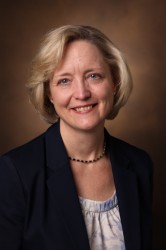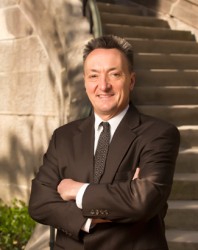An ad hoc committee comprising faculty, administrators and staff from across the university has created a working definition of digital literacy for the Vanderbilt campus and produced a white paper that suggests both curricular and noncurricular ways of implementing digital literacy to advance the university’s mission.

“Embracing educational technologies that foster innovation in learning, teaching and discovery is a key component of Vanderbilt’s Academic Strategic Plan,” Provost and Vice Chancellor for Academic Affairs Susan R. Wente said. “Today’s students must be digitally literate—that is, able to think critically and express themselves effectively using digital media—to be productive participants in our knowledge-based society. The white paper gives tangible suggestions on how to advance in this critical area, and I look forward to working with the committee and to gathering additional input for moving forward.”
The committee, chaired by Associate Provost for Digital Learning John Sloop, defines digital literacy (or literacies) as “a constellation of practices necessary for full participation in contemporary culture,” be the participation social, political or in the workforce.
“In addition to computational skills, a digitally literate person has the capability to produce, curate, share and critically consume and synthesize information in a variety of digital (and non-digital) forms,” the definition says. “Moreover, digital literacy includes a person’s ability to communicate ideas through multiple means of digital design and to decipher and critically reflect on mediated communication while also assessing their own ethical responsibilities in participating or sharing information.”

Suggestions in the white paper include establishing a “microcredentialing” system to certify various types of digital literacy skills. The credentials could be earned through a variety of activities engaging numerous organizations across campus, ranging from the Jean and Alexander Heard Libraries to the Vanderbilt Institute for Digital Learning to the Wond’ry.
Other suggestions include investing in digital tools such as Adobe Creative Cloud, Audacity and GIS to make them more broadly available and to encourage broader faculty participation in the Center for Teaching’s trainings on incorporating more production and consumption of multimedia into the classroom.
Sloop formed the Digital Literacy Committee in 2016 to help develop the working definition and white paper, both of which have been refined continuously based on feedback from faculty and staff.
“The definition of digital literacy and the suggestions put forth in the white paper are ideas to be further investigated, not concrete policies. The committee will continue to seek guidance from faculty as our understanding, development and practice of digital literacy evolves,” Sloop said.
Read the VU White Paper on Digital Literacy >>
Members of the Digital Literacy Committee are:
- John Sloop (chair), associate provost for digital learning, Office of the Provost; professor of communication studies, College of Arts and Science
- Clifford Anderson, associate university librarian for research and learning, Jean and Alexander Heard Library
- Kelly Christie, assistant dean, academic programs and student life, Owen Graduate School of Management
- Robert Grajewski, Evans Family Executive Director of the Wond’ry
- Julie Johnson, associate professor of the practice of computer science, director of undergraduate studies in computer science, School of Engineering
- Stacey Johnson, assistant director for educational technology, Center for Teaching; senior lecturer in Spanish, College of Arts and Science
- Kevin Leander, associate professor of education, Peabody College
- Melissa Mallon, director of Peabody Library; director of liaison and instruction services, Peabody Library
- Sara Manus, music librarian for public services, Jean and Alexander Heard Library
- Gayathri Narasimham, associate director of the Vanderbilt Institute for Digital Learning, Office of the Vice Provost for Learning and Residential Affairs
- Neil Osheroff, John G. Coniglio Professor of Biochemistry, professor of medicine, School of Medicine
- Thomas Palmeri, professor of psychology, College of Arts and Science
- Lynn Ramey, professor of French, College of Arts and Science
- Doug Schmidt, associate chair, Cornelius Vanderbilt Professor of Engineering, professor of computer science, professor of computer engineering, School of Engineering
- Bill Smith, career coach, Career Center